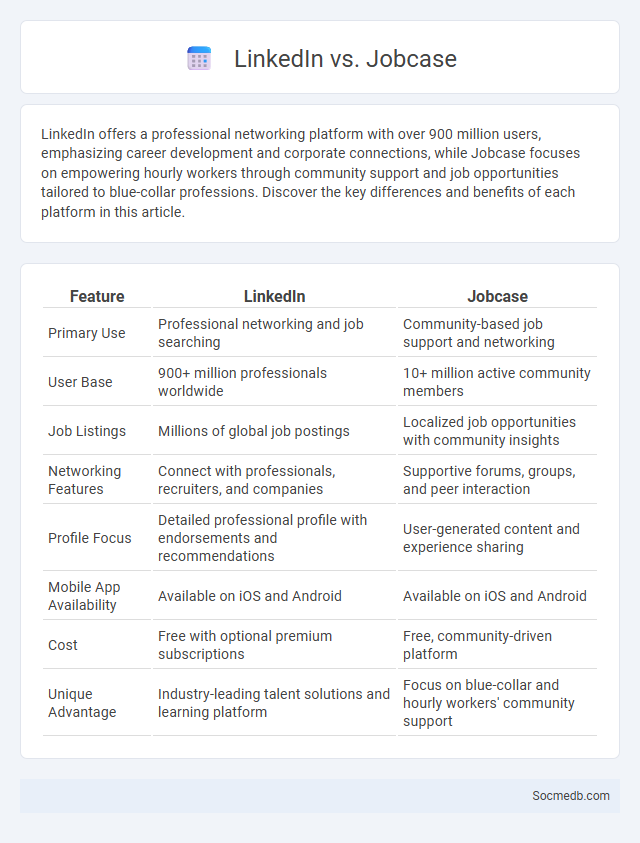
Photo illustration: LinkedIn vs Jobcase
LinkedIn offers a professional networking platform with over 900 million users, emphasizing career development and corporate connections, while Jobcase focuses on empowering hourly workers through community support and job opportunities tailored to blue-collar professions. Discover the key differences and benefits of each platform in this article.
Table of Comparison
| Feature | Jobcase | |
|---|---|---|
| Primary Use | Professional networking and job searching | Community-based job support and networking |
| User Base | 900+ million professionals worldwide | 10+ million active community members |
| Job Listings | Millions of global job postings | Localized job opportunities with community insights |
| Networking Features | Connect with professionals, recruiters, and companies | Supportive forums, groups, and peer interaction |
| Profile Focus | Detailed professional profile with endorsements and recommendations | User-generated content and experience sharing |
| Mobile App Availability | Available on iOS and Android | Available on iOS and Android |
| Cost | Free with optional premium subscriptions | Free, community-driven platform |
| Unique Advantage | Industry-leading talent solutions and learning platform | Focus on blue-collar and hourly workers' community support |
Introduction to Professional Networking Platforms
Professional networking platforms like LinkedIn, Xing, and Meetup provide powerful tools for connecting with industry leaders, discovering job opportunities, and sharing expertise. These platforms enhance Your career growth by enabling targeted networking, skill endorsements, and access to industry-specific groups. Leveraging such networks increases visibility and fosters valuable professional relationships in your field.
Overview: LinkedIn, Jobcase, and Other Professional Networks
LinkedIn boasts over 900 million users worldwide, serving as the leading platform for professional networking, job searching, and industry content sharing. Jobcase, with its focus on blue-collar workers and unique community-driven support, complements professional networks by addressing underrepresented labor market segments. Other platforms like Xing and Glassdoor provide niche career services, including company reviews and regional job listings, enhancing the overall ecosystem for career advancement and professional connections.
User Base and Community Engagement
Social media platforms boast billions of active users globally, with Facebook exceeding 2.9 billion monthly active users and Instagram engaging over 2 billion users. High community engagement is driven by interactive features such as comments, shares, and live streaming, fostering real-time communication and content virality. User-generated content and algorithm-driven personalized feeds further enhance user retention and platform stickiness.
Key Features and Functionalities Compared
Social media platforms offer diverse key features such as real-time messaging, multimedia sharing, and advanced content discovery algorithms that personalize user experience. Functionalities vary from Facebook's extensive event planning and business promotions to Instagram's visual-centric storytelling and TikTok's viral short-form video creation. Integration of social networking with commerce capabilities, live streaming, and interactive community tools distinctly differentiates leading platforms.
Job Search Experience: Effectiveness and Reach
Social media platforms have revolutionized the job search experience by expanding the reach of job postings and enabling targeted networking opportunities. Your ability to showcase skills and connect with industry professionals enhances recruitment effectiveness, resulting in faster and more relevant job matches. Leveraging LinkedIn, Twitter, and specialized job groups increases visibility and access to hidden job markets often missed by traditional methods.
Networking Opportunities for Professionals
Social media platforms such as LinkedIn, Twitter, and Facebook offer unparalleled networking opportunities for professionals seeking to expand their connections within their industry. By engaging with industry-specific groups, participating in discussions, and sharing your expertise, you can build meaningful relationships that lead to career growth and collaboration. Leveraging these tools allows you to stay updated on job openings, industry trends, and professional events that can elevate your career.
Platform Accessibility and User Interface
Social media platforms prioritize platform accessibility by offering features such as screen reader compatibility, adjustable text sizes, and voice command support to ensure inclusivity for users with diverse needs. User interface design emphasizes intuitive navigation, consistent layout, and responsive design to enhance user engagement and satisfaction. Your experience improves significantly when these accessibility and interface elements work seamlessly together, creating an environment that welcomes all users.
Industry Reach and Target Audience
Social media platforms enable businesses to extend their industry reach by targeting specific demographics with precision through advanced analytics and user data. Brands in sectors such as retail, technology, and entertainment leverage social media advertising tools to engage audiences based on interests, behaviors, and geographic locations. Effective audience segmentation on platforms like Facebook, Instagram, and LinkedIn enhances conversion rates by delivering personalized content to relevant consumer groups.
Privacy, Security, and Data Controls
Social media platforms implement advanced encryption protocols and multi-factor authentication to enhance user privacy and secure personal data from unauthorized access. Users are increasingly empowered with granular data controls, allowing them to manage permissions, control information sharing, and customize privacy settings to prevent data misuse. Regulatory frameworks like GDPR and CCPA compel social media companies to enforce transparent data practices, strengthening user trust and compliance.
Choosing the Best Network for Your Career Goals
Selecting the ideal social media platform depends on your career goals and industry focus, with LinkedIn favored for professional networking and job hunting, while Instagram and TikTok suit creative fields like design and marketing. Analyzing user demographics and platform engagement metrics ensures alignment with target audiences and maximizes exposure. Tailoring content to each network's unique features enhances visibility and establishes industry authority, driving career growth effectively.
 socmedb.com
socmedb.com